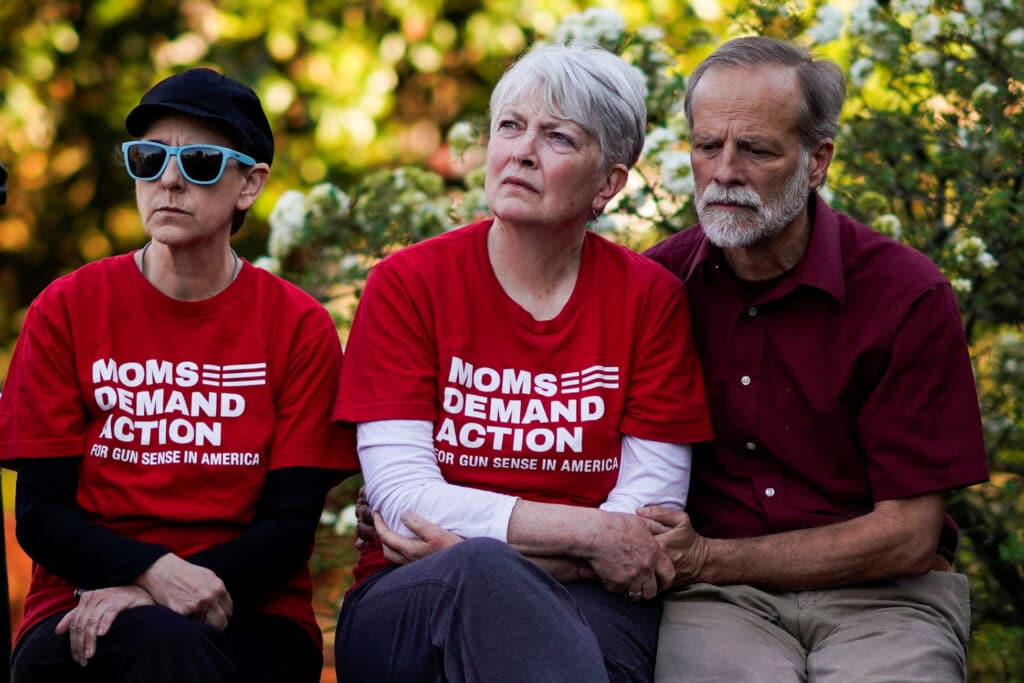Kentucky and Tennessee political leaders on Tuesday called for tighter controls on guns, including tougher laws preventing people in crisis from accessing firearms, after two mass shootings killed 11 people in Louisville and Nashville.
A 23-year-old bank employee shot dead five colleagues and wounded nine other people at his workplace in Louisville, Kentucky, on Monday. On March 27, three 9-year-olds and three staff members were killed at a private Christian school in Nashville, Tennessee, by a former student.
Tennessee Governor Bill Lee urged General Assembly members to find a compromise to bolster the state’s so-called “red flag” laws, aimed at making it more difficult for people deemed to be a threat to the public or themselves from having access to firearms.
“I’m asking the legislature to bring forth thoughtful, practical measures to do that, to strengthen our laws, to separate those dangerous people from firearms, while at the same time preserving the constitutional rights of the people of this state,” the Republican governor told reporters Tuesday morning.
Such legislation would supplement an existing law allowing courts to bar perpetrators of domestic abuse, sexual assault, and stalking from owning or possessing firearms.
Lee’s call for cooperation followed the Republican-dominated Assembly’s expulsion of two Black Democrats who staged a protest in the Tennessee State Capitol calling for tighter gun controls.
The governor also said he would sign an executive order requiring local courts to report criminal records to state law enforcement within 72 hours, a measure aimed at more effective screening of those purchasing guns.
Lee called on the legislature “to separate those dangerous people from firearms, while at the same time preserving the constitutional rights of the people of this state” at a news conference in Nashville on Tuesday.
At a news conference in Louisville, U.S. Representative Morgan McGarvey urged federal lawmakers to support universal background checks. The Democrat said that during his time in the state legislature, he worked with conservative colleagues to introduce laws that would help temporarily remove firearms from people in crisis.
McGarvey pointed out that the Louisville shooter could have been flagged as a risk, citing reports that the man legally purchased the assault-style rifle he used on April 4, and texted or called someone to tell them he was suicidal and contemplating harm before carrying out the shooting.
“We don’t have the tools on the books to deal with someone who is an imminent danger to themselves or to others,” the congressman said.
Mayor Craig Greenberg said at the news conference that Monday’s shooting brought the number of people killed by gun violence in Louisville to 40 in 2023 so far, calling the level of firearms violence in his city “beyond horrific.”
The Democratic mayor noted that under current Kentucky law, the rifle will one day be legally auctioned off, and urged state lawmakers to allow guns used in deadly shootings to be destroyed.
“The laws we have now are enabling violence and murder,” he said.
Any person 21 or older who is eligible to lawfully possess a firearm can carry a concealed deadly weapon, according to Kentucky State Police.
Mass shootings have become commonplace in the U.S. There have been 146 so far in 2023, the most at this point in the year since 2016, according to the Gun Violence Archive. The nonprofit group defines a mass shooting as four or more shot or killed, not including the shooter.
The Louisville gunman was fatally shot at the scene, police said. It was unclear whether he was slain by police or took his own life.
Police identified the shooter as Connor Sturgeon, who was employed at the Old National Bank’s downtown branch at the time of the shooting, Louisville interim Police Chief Jacquelyn Gwinn-Villaroel told reporters at Tuesday’s news conference.
Authorities executed a search warrant at the gunman’s residence and have recovered items, but the chief said she couldn’t disclose details about what was recovered since the investigation was ongoing.
‘IT JUST BREAKS YOUR HEART’
Louisville police responded within minutes to reports of an attacker on Monday morning at the bank office near Slugger Field baseball stadium.
Officers fired at the gunman, who broadcast live video of his attack on social media, police said. He had no prior contact with Louisville police, according to Gwinn-Villaroel.
The dead were identified as Joshua Barrick, 40; Deana Eckert, 57; Thomas Elliot, 63; Juliana Farmer, 45; and James Tutt, 64.
Four of the nine wounded remained hospitalized on Tuesday, with two in intensive care, according to Dr. Jason Smith, chief medical officer at University of Louisville Health.
A 26-year-old recent police academy graduate who was shot in the head remained in critical condition on Tuesday, Smith said. The doctor added his voice to the chorus calling for gun control, saying he was “weary” of having to treat so many shooting victims.
“There’s only so many times you can walk into a room and tell someone they’re not coming home tomorrow,” he said. “It just breaks your heart when you hear someone screaming ‘Mommy’ or ‘Daddy.’”

